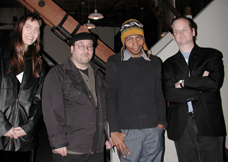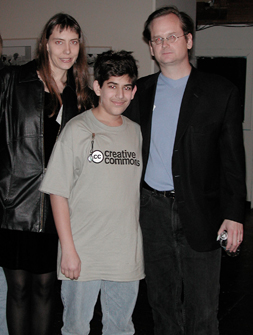I’ll be putting up a movie every day this week: Lawrence Lessig, John Perry Barlow and Jack Valenti today, DJ Spooky Tomorrow, Brewster Khale and (mini-brewster), Craig Newmark, Aaron Swartz and Vicki Bennett as the week goes on…
(Lower resolultion versions available now.)
First Part of Larry’s speech (92.4 MB)
John Perry Barlow and Jack Valenti speeches (75.2 MB)
Second Part of Larry’s speech (78.6 MB)
Category Archives: Creative Commons
Videos Of Creative Commons Launch Up Soon
I’ll be posting video of all the presentations from last Monday’s launch, one a day, starting Monday… (Update 12/31/02 – This stuff is all availablel now on my video index.)
I’m going to start with QuickTimes and then am happy to convert other formats from there on request.
I’ll be storing all of this at the Internet Archive, so I’m happy to generate as many formats as needed to make the footage viewable on all platforms and systems.
Write me with your suggestions/technical requirements at: lisarein@finetuning.com.
Photos From Creative Commons Launch Party
Creative Commons Licenses Up!
Hooray! We have just launched our new website, complete with licensing application and…drumroll please…..the licenses!
Here are a few articles by the Seattle Times, Wired News, MeFi and
Slashdot.
New Interview for Creative Commons: Doc Searls
My new interview with Doc Searls has just been published on the Creative Commons website, along with information about the upcoming December 16th launch!
Doc Searls: Featured Commoner
I think we need to develop a new vernacular understanding of what licensing is. . . . I mean there have always been tacit agreements about what we can and can’t do with stuff — agreements we’ve understood intuitively. Now we need to be much more explicit, because the range of actions that can be taken with our public works is not only much larger, but often committed in digital form, which allows us to be much more specific about the agreements involved…
… I believe there is a crying need for a public conversation about the licensing of artistic works, and for our vocabulary to have the richest and most specific possible bases. That’s why the work Creative Commons does is so important and welcome by attempting to scaffold a new set of commons-native relationships between creators and customers.
First Creative Commons Interview: Rick Prelinger
Our first Creative Commons’ interview is up on the website:
Rick Prelinger.
(Keeper of the Prelinger Archives, which have just been accepted into the Library of Congress.
Through our partnership with the Internet Archive, my images are just going out all over the world. They are achieving a level of spread and penetration I could never do on my own. And therefore, I think that giving things away ends up benefiting me. You know, these images don’t get used up. They don’t get yellow around the edges. They don’t become less valuable from being shown and repeated. Ubiquity equals value. That’s how I think you can make money by giving things away.
Creative Commons Draft Metadata Spec Released
In case you haven’t heard, Creative Commons has released a metadata draft.
There’s also a Mailing list if you’re interested in following the discussion.
So far Ben Hammersley has implemented the schema in mod_cc, and Kevin Burton has implemented it in Mod_Reference and Mod_Subscription.
Plan Top Down, Work Bottom Up
I think those words ring loudest in my head from last week’s E-Tech conference — probably because they were said by half of the speakers there.
Let’s hope I can remember them as I build the Creative Commons’ infrastructure 🙂
Creative Commons at Etech 2002
My talk went great today at Etech. It’s so incredible to talk to everyone and find out just how much of an incredible demand there is for easy-to-use non-commercial licenses!
The website is up now, so go check it out:
http://www.creativecommons.org.
Creative Commons in the NY Times!
Amy Harmon has written a little ditty about the Creative Commons for the NY Times!
A New Direction for Intellectual Property
Perceiving an overly zealous culture of copyright protection, a group of law and technology scholars are setting up Creative Commons, a nonprofit company that will develop ways for artists, writers and others to easily designate their work as freely shareable.
Creative Commons, which is to be officially announced this week at a technology conference in Santa Clara, Calif., has nearly a million dollars in start-up money. The firm’s founders argue that the expansion of legal protection for intellectual property, like a 1998 law extending the term of copyright by 20 years, could inhibit creativity and innovation. But the main focus of Creative Commons will be on clearly identifying the material that is meant to be shared. The idea is that making it easier to place material in the public domain will in itself encourage more people to do so.
The firm’s first project is to design a set of licenses stating the terms under which a given work can be copied and used by others. Musicians who want to build an audience, for instance, might permit people to copy songs for noncommercial use. Graphic designers might allow unlimited copying of certain work as long as it is credited.
The goal is to make such licenses machine-readable, so that anyone could go to an Internet search engine and seek images or a genre of music, for example, that could be copied without legal entanglements.
“It’s a way to mark the spaces people are allowed to walk on,” said Lawrence Lessig, a leading intellectual property expert who will take a partial leave from Stanford Law School for the next three years to serve as the chairman of Creative Commons.
Inspired in part by the free-software movement, which has attracted thousands of computer programmers to contribute their work to the public domain, Creative Commons ultimately plans to create a “conservancy” for donations of valuable intellectual property whose owners might opt for a tax break rather than selling it into private hands.
The firm’s board of directors includes James Boyle, an intellectual property professor at Duke Law School; Hal Abelson, a computer science professor at the Massachusetts Institute of Technology; and Eric Saltzman, executive director of the Berkman Center for Internet and Society at Harvard Law School.

